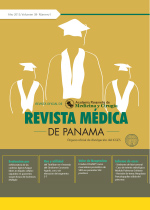Evaluación y Manejo del Cáncer de Mama Metastásico, Irresecable o Recurrente: 1er Consenso Nacional del Cáncer de Mama de la Sociedad Panameña de Oncología (SPO)
Autores/as
DOI:
https://doi.org/10.37980/im.journal.rmdp.2019800Resumen
[Evaluation and Management of Metastatic, Irresectable or Recurrent Breast Cancer: 1st National Consensus of Breast Cancer of the Panamanian Society of Oncology (SPO)]
Resumen
El cáncer de mama metastásico es una enfermedad heterogénea, con poca probabilidad de ser curada; sin embargo, con el advenimiento de nuevas terapias sistémicas se ha conseguido una mejoría sustancial en la supervivencia global [1-3]. La mediana de supervivencia global está entre dos a tres años, con rangos que van de pocos meses a muchos años [4]. La selección de la estrategia terapéutica dependerá tanto del fenotipo tumoral como de factores clínicos. La idea general es dar el tratamiento lo más personalizado posible. Para la mayoría de las pacientes con cáncer de mama metastásico las bases del tratamiento son la terapia sistémica y los mejores cuidados de soporte; pero también hay pacientes que se benefician del control local regional [5-6].
Summary
Metastatic breast cancer is a heterogeneous disease, with little chance of being cured; however, with the advent of new systemic therapies, a substantial improvement in overall survival has been achieved [1-3]. The median overall survival is between two to three years, with ranges ranging from a few months to many years. [4] The selection of therapeutic strategy will depend on both the tumor phenotype and clinical factors. The general idea is to give the treatment as personalized as possible. For the majority of patients with metastatic breast cancer, the bases of treatment are systemic therapy and the best support care; but there are also patients who benefit from local regional control [5-6].
Publicado
Número
Sección
Licencia
Derechos autoriales y de reproducibilidad. La Revista Médica de Panama es un ente académico, sin fines de lucro, que forma parte de la Academia Panameña de Medicina y Cirugía. Sus publicaciones son de tipo acceso gratuito de su contenido para uso individual y académico, sin restricción. Los derechos autoriales de cada artículo son retenidos por sus autores. Al Publicar en la Revista, el autor otorga Licencia permanente, exclusiva, e irrevocable a la Sociedad para la edición del manuscrito, y otorga a la empresa editorial, Infomedic International Licencia de uso de distribución, indexación y comercial exclusiva, permanente e irrevocable de su contenido y para la generación de productos y servicios derivados del mismo. En caso que el autor obtenga la licencia CC BY, el artículo y sus derivados son de libre acceso y distribución.






